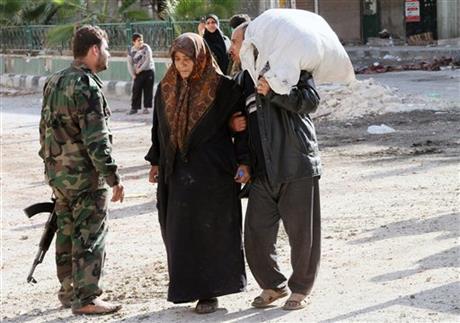
A Syrian soldier is passed by civilians carrying their belongings in the town of Hejeira in the countryside of Damascus which Syrian troops captured on Wednesday, Nov. 13, 2013 as the government forged ahead with a military offensive that already has taken four other opposition strongholds south of the capital. Syrian troops captured a contested suburb of Damascus on Wednesday as the government forged ahead with a punishing military offensive that already has taken four other opposition strongholds south of the capital, state media said.(AP Photo)
Mideast Syria
Residents are directed by soldiers in the town of Hejeira which Syrian troops captured on Wednesday, Nov. 13, 2013 as the government forged ahead with a military offensive that already has taken four other opposition strongholds south of the capital. Syrian troops captured a contested suburb of Damascus on Wednesday as the government forged ahead with a punishing military offensive that already has taken four other opposition strongholds south of the capital, state media said.(AP Photo)
Prev
1 of 2
Next
DAMASCUS, Syria (AP) — The presidents of Syria and Russia discussed a proposed peace conference to end Syria’s nearly three-year civil war and Damascus’ efforts to put its chemical weapons under international supervision, the Kremlin said Thursday.
Norway, meanwhile, said it will send military servicemen to Syria to help the U.N. eliminate President Bashar Assad’s chemical weapons arsenal, becoming the first country to commit to sending troops to Syria.
The United States and Russia have been trying to convene a peace conference in Geneva since May to broker a political solution to the Syrian conflict that activists say has killed more than 120,000 people and displaced millions more.
Speaking to Assad by telephone, Russian leader Vladimir Putin “emphasized efforts taken by Russia together with its partners to prepare a Geneva-2 international conference and gave a positive assessment of Bashar Assad’s readiness to send a Syrian government delegation there,” the Kremlin said.
The Syrian government has said it will take part in the peace talks, although officials have said they will not talk to armed rebels or members of the main Syrian opposition group in exile. Its avowed willingness to attend the Geneva conference coincides with a military offensive that has seen Assad’s forces seize ground near Damascus and in the northern province of Aleppo.
The main Western-backed opposition group, the Syrian National Coalition, said in a statement Monday it would only attend the Geneva talks if humanitarian aid is allowed to reach besieged areas and the government releases political prisoners. The group itself wants any future transitional government to exclude Assad and his close allies, a demand the Syrian government has rejected.
Syrian Information Minister Omran al-Zoubi put the matter bluntly: “The conditions they (the opposition) have announced are nothing but useless screaming.”
“He who believes that he is going to Geneva to receive the keys to Damascus is a silly and frivolous person with no political value or understanding,” al-Zoubi told Syrian state TV late Wednesday.
Russia is one of Assad’s strongest international backers and has used its veto power at the U.N. Security Council in the past to prevent the international community from imposing sanctions on Damascus.
Syrian state-run TV said Putin told Assad that only the Syrian people “should decide their own future.”
The Kremlin also said the two leaders discussed the ongoing effort to place Syrian chemical weapons under international control and dismantle them. It said Putin expressed his satisfaction with the “Syrian authorities’ cooperation with chemical weapons experts.”
The disarmament mission stems from a deadly Aug. 21 attack on opposition-held suburbs of Damascus in which the United Nations has determined the nerve agent sarin was used. Hundreds of people were killed. The U.S. and Western allies accuse Syria’s government of being responsible, while Damascus blames the rebels.
The Obama administration threatened to launch punitive missile strikes against Syria, prompting frantic diplomatic efforts to forestall an attack. Those efforts concluded with September’s unanimous U.N. Security Council resolution endorsing the elimination of Syria’s chemical weapons, a process that began last month.
Norwegian Foreign Minister Borge Brende told The Associated Press in an interview Thursday that Norway will send a civilian cargo ship and Navy frigate to Syrian ports to pick up the weapons and carry them elsewhere for destruction. The U.N.’s Organization for the Prevention of Chemical Weapons is still working out the plan for destroying the stockpiles.
Fifty servicemen usually accompany a Norwegian frigate, but Brende said destroying the weapons is a Norwegian obligation. Denmark is also considering such support.
Meanwhile, Syria’s state-run news agency SANA said mortar rounds and bombs killed three people and wounded 22 in central Damascus on Thursday.
Earlier in the day, state-run Syrian television channel Al-Ikhbariya said two bombs exploded near a famous Damascus bazaar, killing at least one person and wounding seven.
Bomb and mortar attacks are not uncommon in the Syrian capital.
More than 120,000 people have been killed so far in the war, now in its third year, according to the Syrian Observatory for Human Rights, a Britain-based watchdog that closely monitors the violence in Syria through a network of activists across the country. The U.N. said in July that 100,000 Syrians have been killed, and has not updated that figure since.



